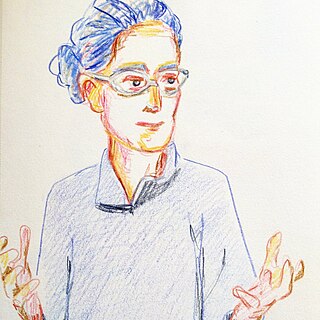Related Research Articles

Existentialism ( ) is a form of philosophical inquiry that explores the problem of human existence and centres on the experience of thinking, feeling, and acting. In the view of the existentialist, the individual's starting point has been called "the existential angst", a sense of dread, disorientation, confusion, or anxiety in the face of an apparently meaningless or absurd world. Existentialist thinkers frequently explore issues related to the meaning, purpose, and value of human existence.
A political spectrum is a system to characterize and classify different political positions in relation to one another. These positions sit upon one or more geometric axes that represent independent political dimensions. The expressions political compass and political map are used to refer to the political spectrum as well, especially to popular two-dimensional models of it.

Rollo Reece May was an American existential psychologist and author of the influential book Love and Will (1969). He is often associated with humanistic psychology and existentialist philosophy, and alongside Viktor Frankl, was a major proponent of existential psychotherapy. The philosopher and theologian Paul Tillich was a close friend who had a significant influence on his work.

Kreuzlingen is a municipality in the district of Kreuzlingen in the canton of Thurgau in north-eastern Switzerland. It is the seat of the district and is the second-largest city of the canton, after Frauenfeld, with a population of about 22,000. Together with the adjoining city of Konstanz just across the border in Germany, Kreuzlingen is part of the largest conurbation on Lake Constance with a population of almost 120,000.

Erikson's stages of psychosocial development, as articulated in the second half of the 20th century by Erik Erikson in collaboration with Joan Erikson, is a comprehensive psychoanalytic theory that identifies a series of eight stages that a healthy developing individual should pass through from infancy to late adulthood. According to Erikson’s theory the results from each stage, whether positive or negative, influences the results of succeeding stages. Erikson published a book called Childhood and Society around the 1950s that made his research well known on the eight stages of psychosocial development. Erikson was originally influenced by Sigmund Freud’s psychosexual stages of development. He began by working with Freud's theories specifically, but as he began to dive deeper into biopsychosocial development and how other environmental factors affect human development, he soon progressed past Freud’s theories and developed his own ideas.

Christian existentialism is a theo-philosophical movement which takes an existentialist approach to Christian theology. The school of thought is often traced back to the work of the Danish philosopher and theologian Søren Kierkegaard (1813–1855).

Dorothy Edith Smith is a Canadian sociologist with research interests in a variety of disciplines, including women's studies, feminist theory, psychology, and educational studies, as well as in certain subfields of sociology, such as the sociology of knowledge, family studies, and methodology. Smith founded the sociological sub-disciplines of feminist standpoint theory and institutional ethnography.

Harry Binswanger is an American philosopher. He is an Objectivist and a board member of the Ayn Rand Institute. He was an associate of Ayn Rand, working with her on The Ayn Rand Lexicon and helping her edit the second edition of Rand's Introduction to Objectivist Epistemology. He is the author of How We Know: Epistemology on an Objectivist Foundation (2014).
Feminism is a collection of movements aimed at defining, establishing, and defending equal political, economic, and social rights for women. Existentialism is a philosophical and cultural movement which holds that the starting point of philosophical thinking must be the individual and the experiences of the individual, that moral thinking and scientific thinking together are not sufficient for understanding all of human existence, and, therefore, that a further set of categories, governed by the norm of authenticity, is necessary to understand human existence. This philosophy analyzes relationships between the individual and things, or other human beings, and how they limit or condition choice.
Existential psychotherapy is a form of psychotherapy based on the model of human nature and experience developed by the existential tradition of European philosophy. It focuses on concepts that are universally applicable to human existence including death, freedom, responsibility, and the meaning of life. Instead of regarding human experiences such as anxiety, alienation and depression as implying the presence of mental illness, existential psychotherapy sees these experiences as natural stages in a normal process of human development and maturation. In facilitating this process of development and maturation, existential psychotherapy involves a philosophical exploration of an individual's experiences stressing the individual's freedom and responsibility to facilitate a higher degree of meaning and well-being in their life.
Binswanger is a surname. Notable people with the surname include:
Medard Boss was a Swiss psychoanalytic psychiatrist who developed a form of psychotherapy known as Daseinsanalysis, which united the psychotherapeutic practice of psychoanalysis with the existential phenomenological philosophy of friend and mentor Martin Heidegger.

Existential crisis, also known as existential dread, are moments when individuals question whether their lives have meaning, purpose, or value, and are negatively impacted by the contemplation. It may be commonly, but not necessarily, tied to depression or inevitably negative speculations on purpose in life such as the futility of all effort. This issue of the meaning and purpose of human existence is a major focus of the philosophical tradition of existentialism.

Otto Ludwig Binswanger was a Swiss psychiatrist and neurologist who came from a famous family of physicians; his father was founder of the Kreuzlingen Sanatorium, and he was uncle to Ludwig Binswanger (1881–1966) who was a major figure in the existential psychology movement. He was brother-in-law to physiotherapist Heinrich Averbeck (1844–1889). Other notable family members include his son-in-law Hans-Constantin Paulssen (1892-1984), who was the first president of the BDA.

Ludwig Binswanger was a Swiss psychiatrist and pioneer in the field of existential psychology. His parents were Robert Johann Binswanger (1850–1910) and Bertha Hasenclever (1847–1896). Robert's German-Jewish father Ludwig "Elieser" Binswanger (1820–1880) was founder, in 1857, of the "Bellevue Sanatorium" in Kreuzlingen. Robert's brother Otto Binswanger (1852–1929) was a professor of psychiatry at the University of Jena.
Ellen West (1888–1921) was a patient of Dr. Ludwig Binswanger who suffered from anorexia nervosa. She became a famous example of existential analysis who died by suicide at age 33 by poisoning herself.

Ludwig is German name, deriving from Old High German Hludwīg, also spelled Hluotwīg. Etymologically, the name can be traced back to the reconstructed Proto-Germanic name *hlūdazwiganą, which is composed of two elements: *hlūdaz and *wiganą respectively, resulting the name meaning "famous warrior" or "famous in battle".
Daseinsanalysis is an existentialist approach to psychoanalysis. It was first developed by Ludwig Binswanger in the 1920s under the concept of "phenomenological anthropology". After the publication of "Basic Forms and Perception of Human Dasein", Binswanger would refer to his approach as Daseinsanalysis. Binswanger's approach was heavily influenced by the German philosopher Martin Heidegger and psychoanalysis founder Sigmund Freud. The philosophy of daseinsanalysis is centered on the thought that the human Dasein is open to any and all experience, and that the phenomenological world is experienced freely in an undistorted way. This way initially being absent from meaning, is the basis for analysis. This theory goes opposite to dualism in the way that it proposes no gap between the human mind and measurable matter. Subjects are taught to think in the terms of being alone with oneself and grasping concepts of personhood, mortality and the dilemma or paradox of living in relationship with other humans while being ultimately alone with oneself. Binswanger believed that all mental issues stemmed from the dilemma of living with other humans and being ultimately alone.
Counterdependency is the state of refusal of attachment, the denial of personal need and dependency, and may extend to the omnipotence and refusal of dialogue found in destructive narcissism, for example.

Growth imperative is a term in economic theory regarding a possible necessity of economic growth. On the micro level, it describes mechanisms that force firms or consumers (households) to increase revenues or consumption to not endanger their income. On the macro level, a political growth imperative exists if economic growth is necessary to avoid economic and social instability or to retain democratic legitimacy, so that other political goals such as climate change mitigation or a reduction of inequality are subordinated to growth policies.
References
- ↑ Binswanger, Ludwig (1963). Being-in-the-World: Selected Papers of Ludwig Binswanger . New York: Basic Books.